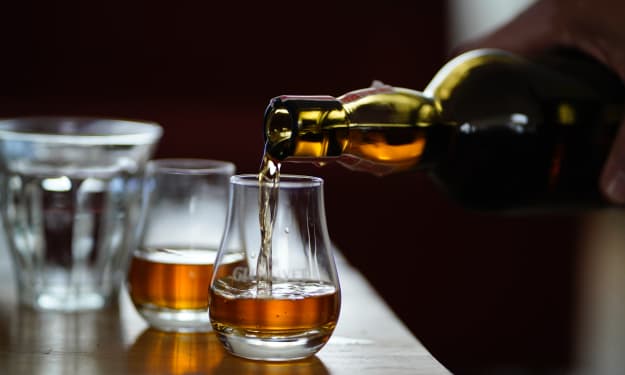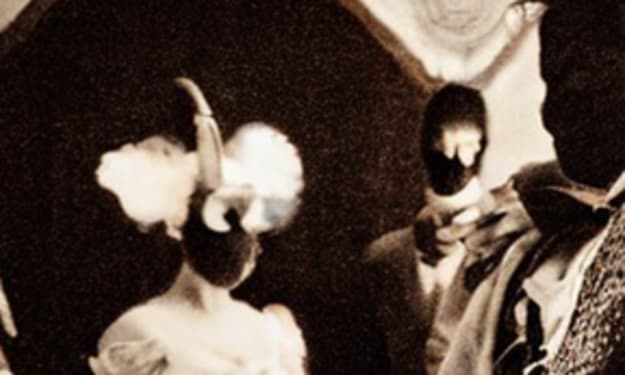
It came and went without much fuss really. There was the predictable ribbing at work, about bus passes and Zimmer frames, and young Eric, the office wag, chipped in with his two penn'orth. He announced, in a sober tone, that as I had now turned sixty, I would be required by law to display a trilby hat in the rear window of my car to alert those behind that my responses may not be as sharp as they once were. Alice brought in a chocolate Swiss roll at lunchtime, which was good of her, and we each had a slice as they sang Happy Birthday. Other than that, the day passed without note.
When I arrived home, there was just one card, from my daughter Jane, who's in Durham. The illustration on the front depicted an anthropomorphic bear throwing darts in a pub, with a pint of beer standing on a nearby table. To a Wonderful Dad, the legend ran.
That Jane had made the effort was pleasing enough, but what was inside the card lifted my spirits like a helium balloon rising to the ceiling. She had taken the trouble to write at some length on both sides of the card, and she included a reminisce, complete with crude cartoon, of an incident that occurred when we were on holiday many years earlier, when I ended up walking back to our hotel wearing only one plimsoll. I stood the card on the front windowsill to show passers-by that, on the momentous occasion of entering my seventh decade, I've at least gone one better than Billy No Mates.
Still, who bothers with cards these days? The old guard, who marked birthdays on the calendar and sent cards off in good time have all passed. My dear wife, Frances, both parents, all grandparents, sister Beverley, Aunt Charlotte. All of them are gone. When they were around, birthdays were big deals, and neglecting to send a card was cause for a level of disgrace that was on a par with being had up for shoplifting from the Co-op. I remember that when my big day came around, there would be a profusion of upright cards on the windowsill that resembled a city skyline. Proper traditional cards as well they were, in pastel hues, often whimsical and never smutty.
Mind, there are two greeting card shops in the local mall, so I suppose there must still be demand.
Of course, time marches on and in today's hi-tech world, many birthday wishes are sent electronically. They say it's the thought that counts, but the greeting I received from my grandson Charlie this morning really ruffled my feathers. It was a text message that comprised just eight characters, all capitals, and it read H-P-Y, space, B-D-Y, space, M-8, which I believe translates as Happy Birthday, mate. Now, I understand that text abbreviations have their place because of the limited number of characters allowed, but this reads more like a car number plate than a loving birthday wish from a grandson to his grandfather. And who calls their grandad mate? This lack of effort will be reflected in the reverse fixture next month when he turns sixteen. He may bank on it.
I don't actually own a mobile phone, never had one, but Charlie is staying with me just now because his mother isn't well, so we've fired up Jane's old one for me to use. This way I can keep in touch with both of them. As telecommunication technology advanced, I stayed loyal to my tried and trusted landline. Yet I rarely even use that these days; not since the X Factor phone vote scandal.
In allowing the mobile revolution to pass me by, I have to admit that I'm hopelessly out of touch as to the whys and wherefores of text messaging. When I showed Charlie's birthday message to Alice at work, I was astonished that she was less concerned with his lack of application than she was with my reply. I'd responded to the abrupt message with Thank you, Charlie, using correct punctuation and capitalisation, and Alice pulled me up on this.
"There's no need to go to all that trouble with texts," she said, "it's all about brevity."
She went on to suggest that I would have appeared more down with the kids had I responded in kind. Instead of typing out thank you in full, she said, T-H-X would have sufficed, as in the language of text messaging this is universally recognised as an abbreviated version of thank you. She added that as Charlie had addressed me as mate, it might have strengthened our bond as equals had I addressed him in the same manner in my reply, although this was entirely a matter of personal choice. I have to say I was utterly flummoxed at how a language of grammar-free abbreviations could take precedence over proper English.
Yet my bewilderment today only matched that of yesterday, when Charlie was out at the local ice rink. I had decided to try my hand at this texting lark and after many corrections made, and a few choice expletives uttered, with my specs perched halfway down my nose, and tongue protruding throughout, I managed to construct the brief query, Would you like shepherd's pie for tea? complete with the possessive apostrophe and question mark. The reply I received was a single letter K.
This made no sense to me. I could only assume that Charlie had sent the message in error after typing the first letter of his reply. I waited for the amended version to come through, but after about ten minutes I sent him another message asking what does K mean? He replied with OK LOL, and this just stirred the pot up even more. I know that Charlie goes about with a little lad called Lol, so I assumed there had been some sort of crossed line and the message I had received was meant for him. When I rang Charlie for clarification, he told me that the message wasn't meant for Lol at all, that LOL is another abbreviation, and that K is short for OK.
Short for OK.
OK only consists of two letters in its full form. How could it ever be a candidate for truncation?
Charlie won't be home till six because he has football practice after school. Well, he's football daft. I suppose he gets that from me, as I got him his first football when he was a toddler, and as he grew up we spent many a happy hour kicking a ball about on the green at the local park.
It only seems like yesterday that Jane blurted out to Frances that she was pregnant. There were tears, but Frances and I were fully supportive of her. Of course, we were disappointed that Jane would be tied down at such a young age, eighteen, but that disappointment was doubled when we met the prospective father, who was introduced to us as Ant.
He was a disagreeable sort; slicked back greasy hair and his jaw in perpetual motion through gum-chewing. Looked like an extra from West Side Story. He played bass guitar in a band with a young girl singer and he swore like a sailor. I also had it on good authority that he smoked pot. He was, though, part of the family, so to show our support, Frances and I went to see his band perform in a local pub one night. It was an awful racket; not my cup of tea at all, but then I listen to classical in the car.
What I did notice that night was that there was a definite chemistry between Ant and the girl singing. I harboured the suspicion that there might be something going on between them, but I kept these thoughts to myself. Then, it was confirmed when Jane brought Charlie home from nursery one day to find a Dear John letter, or in this case, Dear Jane. It said that he was moving to London with the girl singer to make it big.
And so, when he was four years old, I became Charlie's father figure and regular football partner. The absconding parent had left Jane with several hefty bills and a motorbike with a seized engine, and we never heard from him again. Even the Child Support Agency had been unable to trace him.
Mind, he never showed up on Top of the Pops either, so I suppose he's still out there, chewing gum and chasing the dream.
I was a bit pressed for time, so I decided just to make egg mayonnaise sandwiches for tea, to be followed by the remainder of the Swiss roll, which I'd brought home. I was peeling a very hot egg when I jumped in fright at the sound of an incoming message. The text alert on Jane's phone is four rapid knocks like there's someone at the door. I wiped my hands and read the message, which was from Charlie.
TIME WE GO 2 HOSP, it said, all capitals, a number two for the word to, and no punctuation. Still, I've picked up enough text-speak to comprehend that he was making an enquiry as to what time we would be visiting Jane tonight. Being busy with the eggs, I replied without salutation or body text, just the time, 6.30. As soon as I sent the message I felt a pang of guilt for being so brusque, but I consoled myself with Alice's words that it's all about brevity.
I put Charlie's sandwich in the fridge and took mine into the living room with a cup of tea and a slab of cake. As I ate, I reflected on how entering the realm of electronic communication at my time of life had been a baffling experience, but a necessary one forced upon me by Jane's illness. I felt a keen sense of being late to the party; a stranger in a foreign land. Even a non-user like me is aware that everyone goes around these days with their faces buried in their phones. A young woman barged into me in the marketplace last Christmas. Phone up to her face, those little headphones in, completely oblivious to her surroundings. And yet after the collision, which knocked the box of chocolate sea shells I'd just bought to the floor, where it was promptly trodden upon by a passing shopper, she gave me a tut as though it had been my fault.
Wallowing in a feeling of not belonging stirred in me a sudden desire for the physical; a craving for things tangible and familiar. I picked up Jane's card and tears actually ran down my face as I re-read it. To a Wonderful Dad.
Foolishly, I allowed myself to reminisce about the plimsoll incident. Frances was in good health and Jane was only six or seven at the time. The three of us were in Scarborough, and this afternoon we were walking along the beach making for some rock pools we were going to explore. Several young men were playing football on the sand, and a stray shot sent the ball toward our little group. I returned it with an almighty hoof that saw my slip-on plimsoll fly off and disappear down a narrow crevice in the rocks. If my life depended on it, I would never have been able to replicate that shot, yet I got it on the first attempt without trying.
We poked sticks down the crevice in an attempt to retrieve the shoe, but none were long enough. Two of the footballers came over to offer assistance, but their input consisted of little more than sniggering, and I heard one of them refer to me as Hoppy. I suggested waiting until the tide came in when it might float out, but Frances said that it would be less bothersome if we marked this particular shoe down as lost, and bought a new pair of plimsolls in the morning. I conceded and we headed back to the hotel, me hobbling along in one shoe. All the way, Frances and Jane walked some ten yards ahead of me. They kept looking back and giggling at my Chaplinesque gait, which I exaggerated for their benefit. I suppose I must have attracted puzzled looks from passers-by, and it would have been a lot easier for me to remove the remaining plimsoll and walk barefoot, but I didn't care. To see the two people who meant the most to me in the world laughing as they were made the loss of the plimsoll and the funny looks worthwhile.
I set down the card on the coffee table and, after calling myself a soppy sod, dried my eyes on my shirt sleeve. The card and the mobile phone lay side-by-side; the past and the future. On one, there was a loving, well-thought-out handwritten message, and on the other, a series of texts typed in what was to me the equivalent of latter-day hieroglyphics. I felt perfectly at home with the former but hopelessly lost with the latter.
Yet I'm going to have to familiarise myself with the LOLs and the M-8s and the Ks. For there's one text abbreviation Charlie used today that I understood perfectly well, and I'd give my all for it not to be so. When he asked what time we were going to visit Jane at the HOSP, he wasn't referring to the hospital.
He meant the hospice.
(Oriinaly published in Medium)
About the Creator
Joe Young
Blogger and freelance writer from the north-east coast of England






Comments
There are no comments for this story
Be the first to respond and start the conversation.